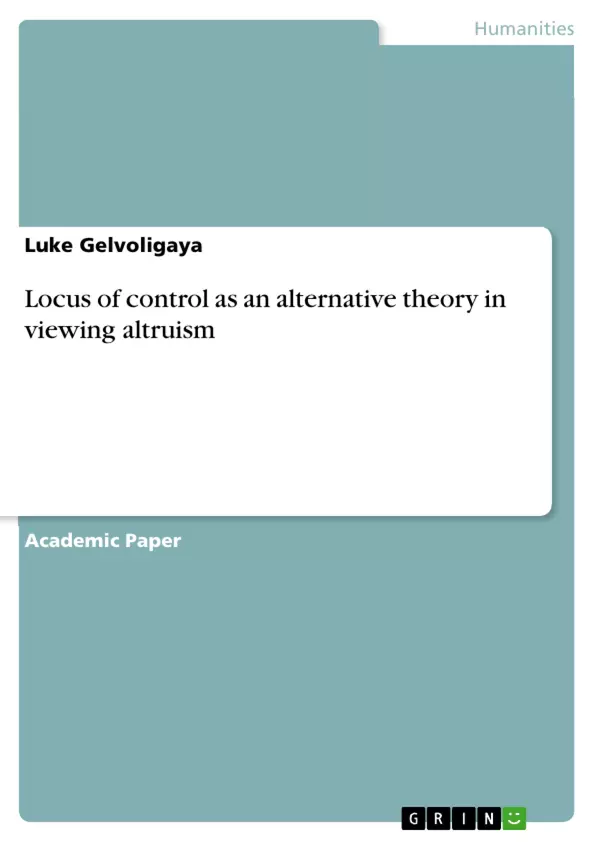Existing theories on Altruism include the evolutionary theory composing on the theory of natural selection and the kin selection theory. Theory of natural selection proposes that genes are able form traits which could develop the system of delivering benefits to other individuals. The theory of kin selection explains how individuals gain benefits through reproduction of relatives and from their own reproduction. On the other hand, a separate theory, the theory of rational choice explains altruistic behavior as measurable by the preferences of the individual. These theories are critiqued according to the problems they pose which affect how altruism evolved and developed. An alternative theory is proposed in examining how altruism is viewed among individuals using the locus of control theory by Julian Rotter. The conceptual and methodological assumptions of using locus of control in research are discussed.
Inhaltsverzeichnis (Table of Contents)
- Abstract
- Locus of Control and Altruism
- Evolutionary Theory: Natural Selection and Benefit Delivery
- Kin Selection Theory
- Critique on Evolutionary Theory and Kin Selection Theory
Zielsetzung und Themenschwerpunkte (Objectives and Key Themes)
This paper explores the development of altruism, focusing on alternative theories to explain this complex social behavior. It examines how the concept of locus of control, as defined by Julian Rotter, can provide a new perspective on altruism. The paper reviews existing theories, such as natural selection and kin selection, and presents critiques of their limitations in fully explaining altruistic behavior.
- Altruism as a social behavior impacting both the actor and recipient
- Critique of evolutionary theories of altruism, including natural selection and kin selection
- Introduction of locus of control theory as an alternative framework for understanding altruism
- Discussion of the conceptual and methodological implications of applying locus of control in research
- Focus on reciprocal altruism and its significance in long-term relationships among non-relatives
Zusammenfassung der Kapitel (Chapter Summaries)
- The introductory chapter defines altruism as a social behavior that can be beneficial or costly for both the actor and recipient, differentiating it from egoism. The chapter also discusses the limitations of existing theories on altruism, including natural selection, kin selection, and the theory of rational choice.
- The chapter on evolutionary theory discusses natural selection and its role in developing traits that promote cooperative and altruistic behavior. It introduces the concept of "benefit delivery devices" and their potential for evolving through natural selection.
- The kin selection theory focuses on the concept of inclusive fitness, where individuals gain benefits through the reproduction of relatives. This chapter explains how this theory can be applied to understanding social behaviors such as altruism, cooperation, and aggression.
- The chapter critically examines the evolutionary theory and kin selection theory, highlighting their limitations in explaining altruism. It explores the possibility of group selection as an alternative approach and emphasizes the importance of reciprocal altruism in understanding human cooperation.
Schlüsselwörter (Keywords)
Key terms and concepts in this paper include altruism, locus of control, evolutionary theory, natural selection, kin selection, benefit delivery, reciprocal altruism, inclusive fitness, and group selection.
Frequently Asked Questions
What is the main alternative theory proposed for understanding altruism?
The paper proposes the "Locus of Control" theory by Julian Rotter as an alternative framework to traditional evolutionary and rational choice theories.
How does Kin Selection Theory explain altruism?
Kin selection theory suggests that individuals perform altruistic acts because they gain indirect genetic benefits through the reproduction and survival of their relatives (inclusive fitness).
What is "Reciprocal Altruism"?
It refers to social behaviors where an individual helps another with the expectation that the favor will be returned in the future, which is significant in long-term relationships among non-relatives.
What are the limitations of evolutionary theories mentioned in the text?
The paper critiques evolutionary and kin selection theories for their inability to fully explain certain complex human social behaviors and suggests group selection as another possibility.
What is the role of Julian Rotter's theory in this research?
Rotter's Locus of Control theory is used to examine how an individual's perception of control over their life affects their tendency to engage in altruistic behavior.
- Citation du texte
- Luke Gelvoligaya (Auteur), 2012, Locus of control as an alternative theory in viewing altruism, Munich, GRIN Verlag, https://www.grin.com/document/280132



